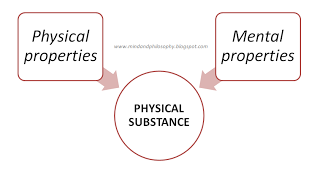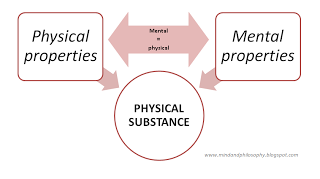Philosophy
- Mental Health Parity And Identity
One of most celebrated questions in philosophy is the mind/body problem, that is, are the mind and the brain the same thing or different things. If they are different, how, if at all, are they interconnected? Let's take an oblique approach to this...
- Descartes, Dualism And Monism
Let?s assume that both you and me do have minds; I guess it would be way easier to think this post over if you had some free mind to use. Otherwise the idea of thought without a mind might get a little bit tricky ? but as you?re about to see, thought...
- Lecture 4 - Cartesian Dualism & The Mind-body Problem
There are all sorts of psychological reasons why people tend to believe that we have an immaterial soul that can somehow overcome the physical limitations of the body (think out-of-body experiences, misinterpretation of brain quirks and our tendency for...
- Substance Dualism
If you believe that, in the ultimate analysis, you are a combination of a physical body and a non-physical soul, then you would be a substance dualist. This tradition has been around for thousands of years, and has been espoused by thinkers as prominent...
- John Searle - Beyond Dualism
Descartes' philosophical articulation and defense of psycho-physical dualism (the idea that the mind has an existence different and independent from the physical body), and the idea that the mind cannot be reduced to simple physical processes, have...
Philosophy
Property dualism: physicalism in disguise?
 |
| Property dualism scheme |
Do you think it is possible to combine the physicalism (materialism) with the substance dualism? (If you don?t know the differences between these two check out the previous post.) For centuries people have tried to find common aspects of completely different ideas, theories etc. (what?s interesting is that this is actually how some religions were established). Philosophers have also tried to find something in common as far as the substance dualism and physical monism are concerned. One of the possible outcomes is the property dualism.
What is exactly the property dualism? As in the case of physicalism it states that there is only one entity (physical). It also states that the physical entity has two properties ? mental and physical; so don?t let yourself be fooled by the word ?dualism?. In fact, the ?dualism? does not refer to the substance dualism but to the dualism of the physical substance. I believe this view is even closer to the monism than to the dualism. Why do I think so?
Let?s come back to the physicalism. A physicalist doesn?t believe in the existence of mental substance. Therefore he tries to explain mental phenomena by referring to the physical processes which take place in the body. It can explain a wide range of ?mental? states, such as love, sadness, envy and so on. Therefore the substances which are regarded as non-physical by a dualist are considered to be corporal from the physical monist?s point of view. What?s the conclusion? The conclusion is that for philosophers in general (regardless of the theory they follow) the distinction between what is physical and what is not, isn?t clear and there is (and probably will be) no consensus in this matter.
Both a property dualist and a physical monist reject the existence of any mental substance ? the only difference between them is that a property dualist acknowledges the existence of mental property whereas a physical monist rejects this possibility as well. Doesn?t it remind you of the problem with the self contradictory definition of substances (we dealt with it in the post ?Physical monism vs. substance dualism?)? If, according to a property dualist, there is no mind and no mental substance how can he define a mental property? The adjective ?mental? was brought to England from France; French mental comes from Latin mentalis which is derived from a Latin noun mens which simply means ?mind?. Since the property dualism states that there is no such thing as ?mind? there is no ground for forming a term ?mental?. But if the term is already coined, having in mind that property dualists do not believe in a mental substance and attribute it to the body, what is in fact the meaning of the term ?mental property?? Either it means nothing or it actually refers to what is regarded by substance dualists as mental but is seen as corporal by those who reject the idea of mental and non-physical property ? and "those" include not only physicalists but also property dualists.
 |
| Does "mental" equal "physical"? |
What do we end up with? With a theory which rejects the existence of a mental entity but sees the mind?s properties within a physical substance and yet claims that the mind as it is seen by substance dualists is actually the part of the body. What is then the difference between the mental and physical properties if mind is physical as well? Isn?t the property dualism a physicalism in disguise? What do you think?
- Mental Health Parity And Identity
One of most celebrated questions in philosophy is the mind/body problem, that is, are the mind and the brain the same thing or different things. If they are different, how, if at all, are they interconnected? Let's take an oblique approach to this...
- Descartes, Dualism And Monism
Let?s assume that both you and me do have minds; I guess it would be way easier to think this post over if you had some free mind to use. Otherwise the idea of thought without a mind might get a little bit tricky ? but as you?re about to see, thought...
- Lecture 4 - Cartesian Dualism & The Mind-body Problem
There are all sorts of psychological reasons why people tend to believe that we have an immaterial soul that can somehow overcome the physical limitations of the body (think out-of-body experiences, misinterpretation of brain quirks and our tendency for...
- Substance Dualism
If you believe that, in the ultimate analysis, you are a combination of a physical body and a non-physical soul, then you would be a substance dualist. This tradition has been around for thousands of years, and has been espoused by thinkers as prominent...
- John Searle - Beyond Dualism
Descartes' philosophical articulation and defense of psycho-physical dualism (the idea that the mind has an existence different and independent from the physical body), and the idea that the mind cannot be reduced to simple physical processes, have...
